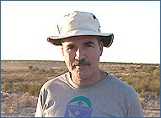Peter Kilmarx Battles Tough Living Conditions in Congo to Help Build Fish Ponds

Peter H. Kilmarx, MD, Chief, Epidemiology Branch, Division of HIV/AIDS Prevention, (CAPT, USPHS) served in the Peace Corps from 1984 to 1986 "I was a fisheries volunteer in Democratic Republic of Congo (ex-Zaire) living as the first and only westerner in a small village. It was very simple living conditions in a thatch roof mud hut with no electricity or running water. I worked with about 20 farmers and their families in about a 20 kilometer radius and together we built about 25 tilapia fish ponds. I am still in touch with them by mail and they continue to raise fish."
Kilmarx continues, "I became interested in public health observing that there were infant deaths every year from measles and wondering how that could happen when we had an effective measles vaccine."
The living conditions were difficult he says, because of poor nutrition, frequent malaria, filarial, giardia, bot flies, etc. But although it was tough personally, he says it helped to give him a strong familiarity of central African culture, people, and development and health issues. "It also gave me a near universal appreciation for life in rural villages in developing countries. The Peace Corps is an important network socially and professionally, including many people at CDC and USAID."
Kilmarx says he was invited to take part in the Ebola Kikwit 1995 response because of his prior experience in DRC. Another skill he picked up, he says, is "I can take a two-stroke motorcycle engine apart and put it back together!"
In his job today, he has used Congolese proverbs on several occasions. "Most recently when addressing a CDC/Atlanta meeting of the Minority AIDS Research Initiative, I noted that bidi bikengela kulala mu nzubu wa muntu mukuabo bua kumanya mvula udi ulota muaba kayi which is to say that ‘you have to sleep in another man´s house to know where the roof let´s the rain in’ and therefore it was very appropriate for CDC to want to develop the capacity of minority researchers to address the HIV/AIDS epidemic in U.S. minority communities. The saying was very well received by the audience."
- Page last reviewed: January 7, 2015
- Page last updated: January 7, 2015
- Content source:
Global Health
Notice: Linking to a non-federal site does not constitute an endorsement by HHS, CDC or any of its employees of the sponsors or the information and products presented on the site.


 ShareCompartir
ShareCompartir